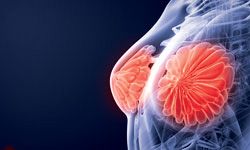Nelipepimut-S Combination Demonstrates 11-Fold Increase in Immune Response in Breast DCIS
Nelipepimut-S in combination with granulocyte-macrophage colony-stimulating factor demonstrated doubling of the difference in the increase in antigen-specific CD8 cytotoxic T-lymphocytes in patients with ductal carcinoma in situ of the breast who were HLA-A2-positive or A3-positive, express HER2 at immunohistochemistry1+, 2+, or 3+ levels, and are pre- or post-menopausal, according to preliminary results from the phase II VADIS study.

Nelipepimut-S (NPS) in combination with granulocyte-macrophage colony-stimulating factor (GM-CSF) demonstrated doubling of the difference in the increase in antigen-specific CD8 cytotoxic T-lymphocytes in patients with ductal carcinoma in situ (DCIS) of the breast who were HLA-A2-positive or A3-positive, express HER2 at immunohistochemistry1+, 2+, or 3+ levels, and are pre- or post-menopausal, according to preliminary results from the phase II VADIS study announced in a press release from Sella Life Sciences Group, Inc.
“The preliminary data from the VADIS study showing a doubling of the difference in the increase in antigen-specific CD8 cytotoxic T-lymphocytes in NPS-treated patients vs. controls, even with a single NPS inoculation, indicate in vivo immunogenicity of this cancer vaccine in DCIS. These data, as well as the previously reported clinical effects of NPS in the adjuvant setting after frontline therapy for invasive breast cancer, provide support for the possibility that NPS may be able to decrease the rate of recurrences in earlier-stage disease, such as DCIS, which I believe should be studied formally in future clinical studies,” Elizabeth Mittendorf, MD, PhD, physician and director of the Breast Immuno-Oncology Program at Dana Farber Cancer Institute, said in a press release.
Thirteen patients were enrolled in the study overall. Nine patients were placed into the NPS combination group, and 4 patients were in the GM-CSF monotherapy group. The percentage of NPS-specific CD8 cytotoxic T-lymphocytes (NPS-CLT%) was twice as large in terms of frequency in patients who were treated with NPS than those treated with GM-CSF only. Investigators measured NPS-CLT% in the peripheral blood using a sensitive and specific assay using dextramer staining followed by flow cytometry. NPS-CLT% was measured at baseline, which was defined as the time before GM-CSF vaccination and 30 days after surgery.
The NPS arm showed a mean increase of +0.10% in NPS-CTL% versus an increase of +0.05% in the control group. From baseline, the mean change was an 11-fold increase from 0.01% to 0.11%. Investigators interpreted from these changes that antigen-specific T-cell response continues post-NPS vaccination.
The safety data shows that NPS was generally well-tolerated, and no drug-related unexpected serious adverse reactions occurred. Overall, the safety profile was consistent with previous data.
In the ongoing study, patients are randomized 1:1 to receive NPS plus the GM-CSF vaccine followed by a surgical procedure or the GM-CSF vaccine followed by a surgical procedure. The primary end point of the VADIS trial is the difference in the frequency of newly induced NPS-cytotoxic T lymphocytes in peripheral blood between the two arms of the study, using a dextramer assay. The secondary end point is the nature and incidence of adverse events and in vivo immune response to NPS, in addition to other select histologic and molecular biomarkers, which are to be compared between the 2 study arms.
Eligibility criterion for the study included ECOG performance status must be 0 or 1, clinical chemistry less than 2 x normal upper limit of normal range, platelets ≥ 100,000/mm3, hemoglobin ≥ 10 g/dL, blood urea nitrogen < 2 x upper limit of normal (ULN), alkaline phosphatase < 2 x ULN, lactate dehydrogenase < 2 x ULN, creatinine < 2 x ULN, bilirubin < 2 x ULN, aspartate aminotransferase and alanine aminotransferase < 2 x ULN, and a normal ejection fraction. Some patients were excluded from the study due to prior treatments, history of non-breast malignancy, infections, and comorbidities.
“While additional analyses of certain histologic and molecular markers of the patients’ immune responses against the NPS and other HER2 antigenic epitopes are currently ongoing, these initial immunobiological results from the VADIS study are encouraging,” said Mittendorf.
Final data from the VADIS trial are being analyzed by the National Institute of Health and MD Anderson Cancer Center, as well as the principal investigator, Mittendorf. These data will be presented at an upcoming meeting.
Reference:
SELLAS Announces Positive Antigen-Specific Immune Response Data for Nelipepimut-S (NPS) in Women with Ductal Carcinoma In Situ (DCIS) of the Breast from Phase 2 VADIS Study [news release]. New York, New York: Sellas Life Sciences Group, Inc. March 18, 2020. https://bit.ly/33vEutj. Accessed March 19, 2020.
Jhaveri Compares Safety and Duration of Adjuvant CDK4/6 Inhibitors in HR+ Breast Cancer
December 22nd 2024During a Case-Based Roundtable® event, Komal Jhaveri, MD, FACP, discussed dosing and toxicity concerns with the approved CDK4/6 inhibitor regimens used in the adjuvant setting for patients with hormone receptor–positive breast cancer.
Read More
Breast Cancer Leans into the Decade of Antibody-Drug Conjugates, Experts Discuss
September 25th 2020In season 1, episode 3 of Targeted Talks, the importance of precision medicine in breast cancer, and how that vitally differs in community oncology compared with academic settings, is the topic of discussion.
Listen
ctDNA Detection Tied to Tumor Burden, Recurrence in HR+ Early Breast Cancer
December 13th 2024A phase 2 trial showed ctDNA detection in HR-positive early breast cancer was linked to larger tumors, higher residual cancer burden, and increased recurrence after neoadjuvant endocrine therapy.
Read More